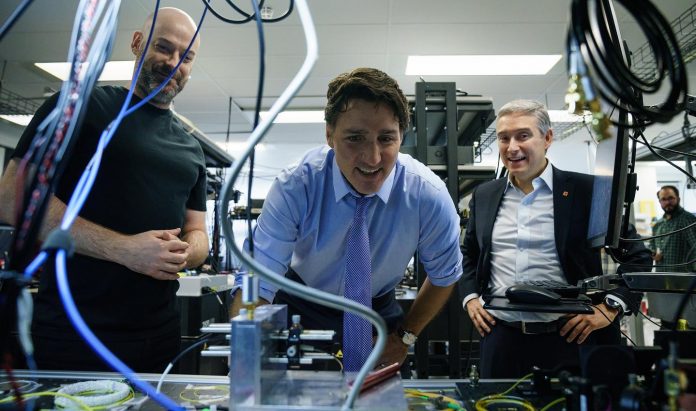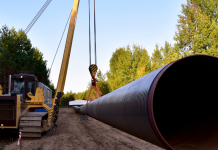
What does the Liberal’s Supercluster strategy tell us about the new $83B CleanTech bonanza? – Mark McQueen
“Budget 2023 a missed opportunity to keep Canada competitive in science and research”
Universities Canada
When Academics are publicly critical of a Liberal government, you know things are bleak.
One might have thought there would be plenty of residual support for the Grits from Canada’s Academia, what with all of the rumoured Supercluster funding and exorbitant deficit spending over the 8-year life of the Trudeau government. Myth busted, apparently.
For many of us in the VC community, the “Supercluster” strategy looked more like a regional development program than anything else, with four of the five HQs in towns that tend to vote Left, but it would appear that the billions that we thought had been spirited away to the photo op-of-the-moment may not have flowed into the research coffers of grateful University profs, after all:
source: Universities Canada release"Today’s federal Budget failed to deliver the much-needed investments in Canada’s research ecosystem that are required to support the people and ideas Canada needs to ensure an inclusive and prosperous future and build the clean economy of tomorrow.""The federal government’s own Advisory Panel on the Federal Research Support System recommended significant funding increases to the research granting councils and graduate scholarships. Canada’s universities are disappointed to see the government fail to deliver these necessary reinvestments in Budget 2023."
“The only way to sustainably pay for the social programs and services that all Canadians value is by driving economic growth and prosperity, and that should start with innovative, 21st century Canadian companies. We are in a difficult and uncertain economic environment for the tech sector, and today’s budget did little to support Canada’s most promising businesses through a challenging time.”
The Canadian Council of Innovators chimed in, too, reflecting the perspective of 150 Canadian CEOs from the Innovation Economy:
If you think I’m being partisan, former Liberal Finance Minister Bill Morneau is going to great lengths to point out that Canada’s economy is on the wrong track, as per his recent book, “Where To From Here:”
"In 2019 Canada fell from the top 10 in an index of the world’s most competitive countries, and was down to 14th by last year. The Organization for Economic Co-operation and Development recently ranked Canada last out of 38 countries in per capita economic growth, and predicted it would be the “worst-performing advanced economy over 2020 to 2030 and the three decades after.”
Now, if I wanted to blow £33, I could subscribe to an 18-month old Oxford Academic article that promises to discuss the “origins of the supercluster initiative and trace its roots back to major research traditions on regional agglomerations and territorial innovation models, in particular the cluster theory, the regional innovation system, and the entrepreneurial ecosystem approaches.”
More relevant, perhaps, is the tease that they have “four critical questions (or challenges) that need to be addressed to clarify the scope and objectives of the policy.”
At this stage in the Supercluster experience, five years in, I think it’s becoming clear that a core component of the Liberal innovation strategy is failing — despite an Ernst & Young report (management consulting fee alert!) claiming that the “Clusters” have made “significant progress toward creating or sustaining approximately 23,9000 FTE jobs over the past 4+ years.”
Across the Digital Technology, Protein Industries, Advanced Manufacturing, AI and Ocean Superclusters, E&Y reports that $1.6 billion was spent over the 5-year period ending FY23. If that sounds juicy, consider this: over the four month period ending Jan. 31/22, the five Superclusters “provided nearly $44 million in new project funding.”
Yawn; $44 million is a decently-sized venture debt loan to a single company.
Depending on where you sit, an average of $320 million of aggregate Supercluster spending per annum might sound like a lot of cabbage. Yet, if you compare that to what venture capitalists invested in Canadian companies in either 2019 ($6.2 billion) or 2022 ($10 billion), for example, the Supercluster taxpayer spend is a rounding error. It’s certainly doing nothing to materially support Canada’s economic growth, in any event.
Perhaps taxpayers will take comfort that the 2023 Federal Budget’s focus on Clean Tech may reflect a pivot to a different type of industrial policy, but most of the money isn’t necessarily going to “tech” per se. As I pointed out on BNN Bloomberg last month, a new federal policy supporting taxpayer contributions to the refurbishment of a hydro dam turbine isn’t going to solve Canada’s woeful projected economic performance. Those aren’t the jobs of the future.
The last eight years of Liberal machinations does beg the age-old question: Who has confidence that the government has suddenly figured out how to pick winners and losers? Canadair, de Havilland aircraft, MIL-Davie, the Westray Coal mine, are all examples of where that’s failed in the past. Your daily reminder was provided by The Information’s Steve Levine, who delved into the topic via a piece entitled “Beware the Pitfalls of a Subsidized EV and Battery Industry.”
"For years, U.S. economists, politicians and pundits have denigrated China’s battery and electric vehicle industries, suggesting that because the government has subsidized them, they are somehow mere inventions and not real. Now the U.S. itself is aggressively pursuing the subsidy path to industrialization, arguably conceding that China has been right all along. Congress has marshaled some $250 billion in tax credits, grants and loans for the EV and battery industries. And last week, the Biden administration doubled down, proposing new tailpipe emissions rules in a quest to electrify two-thirds of new U.S. vehicle sales within a decade."
"The U.S. initiative is exceedingly ambitious, assembling American allies into a consortium that it hopes will collectively compete with the EV and battery industries that China has spent a dozen years building. But a question remains: Will the subsidies work?"
"Some scholars and industry analysts say the subsidy programs on which China’s manufacturing giants have relied for the last four decades have been far less successful than they might seem, and that the U.S. should be cautious how it emulates them. Lee Branstetter, an economics professor at Carnegie Mellon University, says China—like Japan, whose governments have also propped up its manufacturing industry—has tended to favor politically connected companies that employ a lot of workers but don’t deliver more efficient production or disruptive technologies."
"Studying the data for all companies that filed from 2007 to 2018, including auto and battery makers, he and his team concluded that subsidies went primarily to companies with comparatively low labor productivity and a weak record of filing for patents. Officials administering the subsidies appeared to be conflicted—they wanted to fund disruptive technology but also promote stability. So along with economic winners, they “compensated the losers, because dying firms that lay off lots of employees are a headache for the local Communist Party boss.” In short, the officials want to do too much and end up diluting the impact of the subsidies. “What we find is [that] the subsidies are going to less productive firms,” Branstetter said, “and that after firms receive the subsidies, they become even less productive than they were before.”
This is the challenge for Canadian politicians looking to use the tools of the State to reverse what the OECD says will be the “worst-performing advanced economy over 2020 to 2030.” I truly believe that government policy can play a role in fostering the right environment for capital formation, scientific breakthroughs, start-ups, infrastructure development, economic growth as well as job creation.
Who has confidence that — at this moment in our country’s history — we have the right formula? Not I.
























